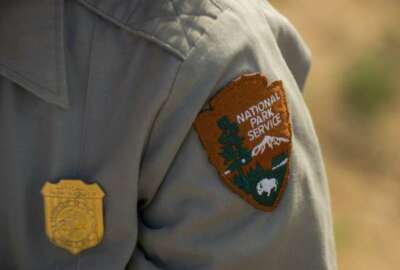
NPS answering ‘wake-up call’ to address sexual harassment, employee misconduct
The National Park Service introduced a number of steps to combat personnel issues, such as establishing an ombuds office, conducting a comprehensive survey, and...
For the past century, the National Park Service protected the country’s parks, but starting this year, the agency says the focus will be on protecting and investing in people.
Testifying before a Senate subcommittee June 7, Acting NPS Director Michael Reynolds pledged that his agency was taking steps to get out of the shadow cast by patterns of sexual harassment and lack of leadership on employee misconduct, and usher in a new era of improved management and safe workspaces.
“Unfortunately, last year we saw the emergence of several sexual harassment and hostile work environment cases; there are some park locations where these cases were allowed to fester, where employees felt that reporting these conditions would change nothing and invite retaliation,” Reynolds said during the Senate Committee on Energy and Natural Resources’ Subcommittee on National Parks hearing. “That was a wake-up call that we needed to make significant improvements to our workplace environment.”
Those improvements include establishing an ombuds office, requiring new training for employees and management, hiring a sexual harassment prevention and response coordinator, and conducting a comprehensive employee survey, which Reynolds said does more than just report on the presence of sexual harassment in NPS offices and parks.
“What the survey is trying to delve into, is getting employees to answer appropriate questions that help us understand how to apply our resources best strategically ahead, how we would actually help employees feel safe in reporting,” Reynolds said. “This was a survey to help us understand the kind of harassment … the categories that they might be experiencing so we can focus on our employees’ best.”
The survey was conducted January-March, and final data from the answers are expected by the end of the summer, Reynolds said.
NPS consulted with representatives from the military, Reynolds said, and they helped the agency understand why a specialized survey would work. The park service used a subcontractor under the CFI Group, which is a contractor for the Interior Department.
The park service is also conducting a similar survey with its roughly 4,700 summer seasonal employees in July. Part of sexual harassment prevention and response coordinator Tammy Duchesne’s job will be to help coordinate the launch of that survey.
Duchesne is on temporary assignment from her post as superintendent at Kaloko-Honokohau National Historic Park in Kailua-Kona, Hawaii.
Along with the seasonal employee survey, she will be helping to digest the final results of the full-time employee survey and reviewing online training materials to ensure they are accessible and understandable.
“We are looking to make improvements in our policies to vet those, so that we can ensure that people know how to report, and there are clear ways to know how to proceed both from the employee standpoint and the manager’s, so that complaints don’t get buried,” Duchesne told Federal News Radio after the hearing.
1,000 comments
Management’s role in ending sexual harassment and misconduct — or at least properly handling complaints and incident reports — was brought up several times during the subcommittee hearing.
Mary Kendall, deputy inspector general at the Interior Department, said the “tone at the top” was something that “could not be more important for NPS and its future.”
“I think that working with their folks at headquarters, superintendents, regional directors; they’re the people who are going to have to model the behavior in a very transparent, and I would say upfront and almost an aggressive way to let their folks know in the field that they’re serious about this,” Kendall said, when asked the top three most urgent actions that NPS needs to take.
The other actions include training employees and letting them know they should have no fear of retaliation if they report an incident of harassment or misconduct, and keeping open lines of communication.
Kendall credited the creation of the ombuds office as a step in the right direction, and said Reynolds was prompt and responsive to her office’s reports. She said NPS does, however, need to make “immediate changes” to its ethics program, which has only one full-time ethics counselor.
She also said NPS should change ethics training requirements to cover all employees, and have it focus on conflicts of interest risks, something which “pervades the service.”
Sen. Mazie Hirono (D-Hawaii), the ranking member of the subcommittee, told Reynolds the ombuds’ site provided very general information and did not seem to highlight the problem at hand.
“This area, prevention is really important, but a part of that prevention is that people need to know when their rights are being infringed upon and that there are very clear steps that can be taken to report,” Hirono said. “As far as I can see [on the ombuds site] there’s nothing that leaps out at me that this particular problem of sexual harassment is something you are particularly interested in preventing. You have to go through a lot of it to figure out what you’re supposed to do.”
Reynolds said as this was the first year of the ombuds office, NPS was taking the approach of having it be a resource to answer a variety of employee concerns, but he would take Hirono’s observations and add them to a future strategy for the office.
Reynolds said the ombuds office, which opened in November 2016, received 1,000 comments [including complaints and recommendations] in four months.
Challenges ahead
Reynolds also said in terms of employee training, NPS was working on shortening the 60-day time frame for No FEAR Act training, and working to include it in the onboarding process for new employees, which is particularly important for seasonal workers.
Sen. John Barasso (R-Mont.) wanted to know what the witnesses thought about proposed online employee training. Reynolds said online training could be done more quickly, which was the point of this year, and also was an effective use of the agency’s resources.
The president’s proposed fiscal 2018 discretionary spending budget is $2.6 billion, which is roughly $297 million below fiscal 2017 levels.
That could pose problems for the agency’s efforts, said Maria Burks, executive council member for the Coalition to Protect America’s National Parks.
“If training can’t be conducted in really effective ways, and if it can’t be reinforced on a regular basis, with regular personal conduct, I think it’s going to be very challenging for the service,” Burks said.
Copyright © 2024 Federal News Network. All rights reserved. This website is not intended for users located within the European Economic Area.





